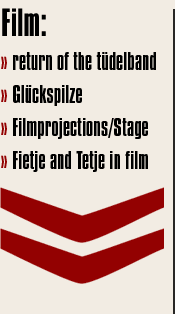
|
|

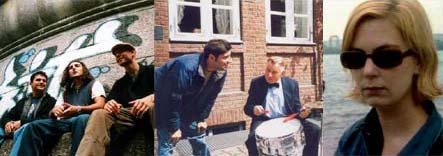
The Film
"return of the tüdelband" Gebrüder Wolf Story
A Film by Jens Huckeriede,
35 mm, 81:30 min., coloured, Dolby SR, Germany 2003 thede filmproduktion
More Pictures
The film "return of the tüdelband" is a journey from contemporary music into German-Jewish history: The young Hip-Hop musician Dan Wolf starts out from San Francisco to look for the roots and memories of his ancestors in Hamburg. Music plays an important part. With Hip-Hop of Hamburg school, folk and techno-beats, mixed with catchy texts, poetic, humorous and in their simple language often full of truths about life.
The "Gebrüder Wolf" (Wolf Brothers) performed in the 1910s´ and 1920s´ in the nightclubs around the Reeperbahn in Hamburg. They were very popular and successful and soon became the owners of the "Operettenhaus"(music hall/ vaudeville theatre). They gave many performances on international stages: light music with impudent, and somewhat suggestive texts were their specialty.
The Wolfs revues must have put the audience in a most cheerful mood with their theatrical irony and ribald jokes. The Hamburg dialect of their songs and sketches contributed in making them the "favourites" of the Hamburg audience. The song "An de Eck steiht«n Jung mit«n Tüdelband" that goes back to a song written by Ludwig Wolf, is Hamburg´s secret anthem even today.
Being a Jewish family the Wolfs could not escape from the rising National Socialism. Neither changing their family name from Isaac to Wolf, nor the strong bond to their German audience helped this musical family escape from the terror of the Nazis. Neither the fact that the Wolfs sang popular German songs nor their popularity was able to save them. Members of the family were murdered in the concentration camps by the Nazis. Some of them were able to survive in emigration. The escape routes steered some of them via Shanghai to the United States, where the Wolfs performed in a new formation and tried to follow up on their former success.
A descendant of the survivors, Dan Wolf, begins his journey in the opposite direction: a Jewish American starts searching for the roots of his history in Hamburg. While doing so, he not only finds answers relating to the social life of Jews and non-Jews, of people from different cultures and different ways of life - above all he discovers his artistic roots. As with the Wolf Trio his language is also music. And Dan Wolf - like his famous ancestors - establishes a direct contact to his audience with Hip-Hop as a kind of contemporary folk music. He raps his feelings and impressions in the streets of Hamburg and he become aware of his family story, which is painfully tied to the political history of Germany.
The film is comparable with a search of identity in which Dan leads his spectators through a Hamburg that had not been identified as a part of the official culture of recollection: from the photo archive of the "Flora"(a hall where the Gebrüder Wolf performed) to the interior of the "Bismarckdenkmal"(memorial for Bismarck with an old air raid shelter underneath) above the "Landungsbrücken" (quayside of Hamburg).
The film puts past into present and present into past. The individual fate of a Jewish family is only told in passing. It is about the presence of history in a young musician´s biography. The consequences of German history have seldom been presented in a film in such a lively and uncomplicated manner and thereby achieve a positive break.
Without moralising, the film makes it clear how close today is tied to yesterday. - And that the Tüdelband is up to date, as proven by the many new versions composed by Hamburg music groups. They make the film an enjoyable event. Jens Huckeriede´s film follows different paths to those we are usually accustomed to when German history is being dealt with; a history that is not a closed chapter, whose traces only lead into awkward silence and compensation but instead a history that is a cultural part of our life.
The work of the filmmaker and artist Jens Huckeriede focuses on the way history is dealt with and forms of recollection. The film "return of the tüdelband" is part of a cycle of works, that deal with the story of the Gebrüder Wolf and furthermore Jewish life in Germany: a historical exhibition, installations at sites of former Jewish life, organized concerts and readings are only some of his individual projects relating to the theme. In the sense of Joseph Beuys these projects are social sculptures in which the artist as an initiator offers different entrances to the contents for the recipient. The audience as well as the integration of the events into cultural politics thereby, is an integral part of the whole procedure.
As with Jens Huckeriede´s earlier works, the film has an effect on the spectator: you start enjoying history and you won´t get Hamburg´s secret anthem out of your head!
Gabriele Staarmann
The Lucky Dogs (copy still lost)
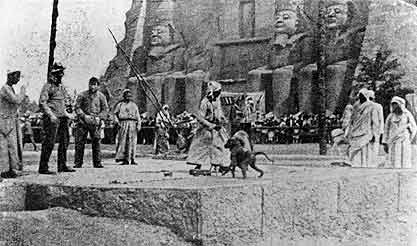
Monopol-Film of HAMBURGER FILM-BÖRSE
Krüger, Vogt & Bürli, 60 Min., Germany 1912
Director: Ludwig and Leopold Wolf
Leading actors:
The Wolf brothers from the "Neues Operetten Theater" Hamburg as well as the leading artists of this theatre.
Corps de ballet of the "Ballhaus Fledermaus", dance on pointes performed by Miss Rosel del Jano.
Further on collaboration of the Original-Bedouin-troop, who are guests of the Hagenbeck Zoo at the moment.
Description:
1. A trader falls into the Elbe playing ball with his daughter. Exercising their profession Tetje and Fietje are near the
scene and then succeed in saving the casualty from the wet element. As they render assistance under comic circumstances -
their true sympathy isn´t to be mistaken - the one rescued shows up fully conscious of his debt, by presenting his
wallet to his rescuers. The large number of money bills in the wallet initiates a true euphoria. "Now we want to act
like the fat William". That first of all includes a road trip, secondly a bottle of sparkling wine.
2. (...) So isn´t there a duty in decency especially as a topping with the after-effects of the wine, that you
applaud the bust of the founder of the Hagenbeck-foundation? When you have money, you can see the devil dance, an old
saying suggests. That´s so indeed and if you have as much money as Tetje and Fietje, you can let Hagenbeck´s
Bedouin-troop dance, you can flirt with some Bedouin women but not without their husband´s protests, you can tease
the monkeys and camels, can participate in war games and even climb a camel (...)
3. (...) Tetje and Fietje had to pass some islands of spirit or - better said - visit them and so there´s nothing
to wonder about, that they use the fish they bought as projectiles, that they were thrown out of their local bar at the
Fishmarket, did a lot of fooling around and caused a tumult in the entire market. The end of the song of course, is a
conflict with the police and the ensuing arrest. (...)
4. (...) His birthday celebration gives the rescued wholesale merchant Petersen reason to invite Fietje and Tetje.
WeIl, he doesn´t do it without concern but he just owes those two that he can still celebrate his birthday, and
they can claim to take part in his sense of delight on that day. (...) Petersen´s other guests are appalled at
those guys´ arrival and their behaviour justifies that. Everyone is happy to get rid of them, after they finally
participated in the dance in their own particular way as well.
5. It´s natural that the two lucky dogs cannot go directly home, they just have to go loafing around and so they
decide to frequent the ballroom "Fledermaus". At first their arrival attracts attention, but the merry mood
of the ballroom guests wins out and everybody has a fantastic time watching the antics of the lucky dogs. (...)
6. (...) In the final scene the two leading actors say good-bye to the viewers. Fietje´s coffee-bottle shows the
inscription "Hol di gesund" (keep yourself healthy). What does that want to tell us? Well, Tetje and Fietje
brought an hour of happiness to the viewers, during which they were heartily Iaughing and they hope that this will have
a lasting effect.
Source: Synopsis to the film "Glückspilze".
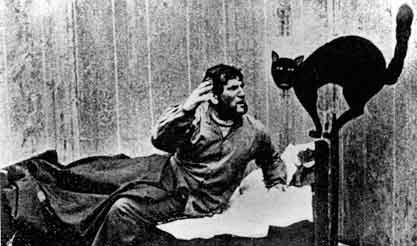
Film projection on stage 1911/1912
The "Gebrüder Wolf" experiment as early as 1911 with the new medium film. They show self-made film material in various
spectacular revues, and perform satires of it on stage.
In a newspaper article dating from 1912 in which "Was kost´ Hamburg?" is reviewed, a reference is made to the film work
of the "Gebrüder Wolf":
"As in "Rund um die Alster", film pictures and reality were connected, so that various drastic-comical effects were
attained, causing lively amusement. (...)
In the fifth scene the popular shelters at die Wittenberge open-air bath are exploited in a quite funny manner. Here the Wolf brothers
go into action for the first time. Their escape in bathing suits is illustrated in drastic film pictures.
In the next scene they arrive at die horseracing track in Horn, where they produce their continually successful comic scenes as jockeys.
The ending is finally made up of magnificent military pictures, the arrival of troops oft he European Great Powers with their rulers
leading in front, and then ending as a glorification of the "Dreibund" giving the audience the chance to express their
patriotism. - In all these scenes expenses are made on decoration and costumes that alone are worth being seen."
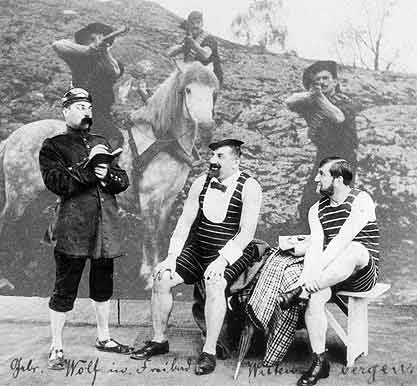
[News | Film | Theater | Music | Photo]
[Installation | Literature | Progress | Wolf Brothers | Publications]
[Emigration | Public Events | Press | Masthead]
© 2004 2nd spring
|







